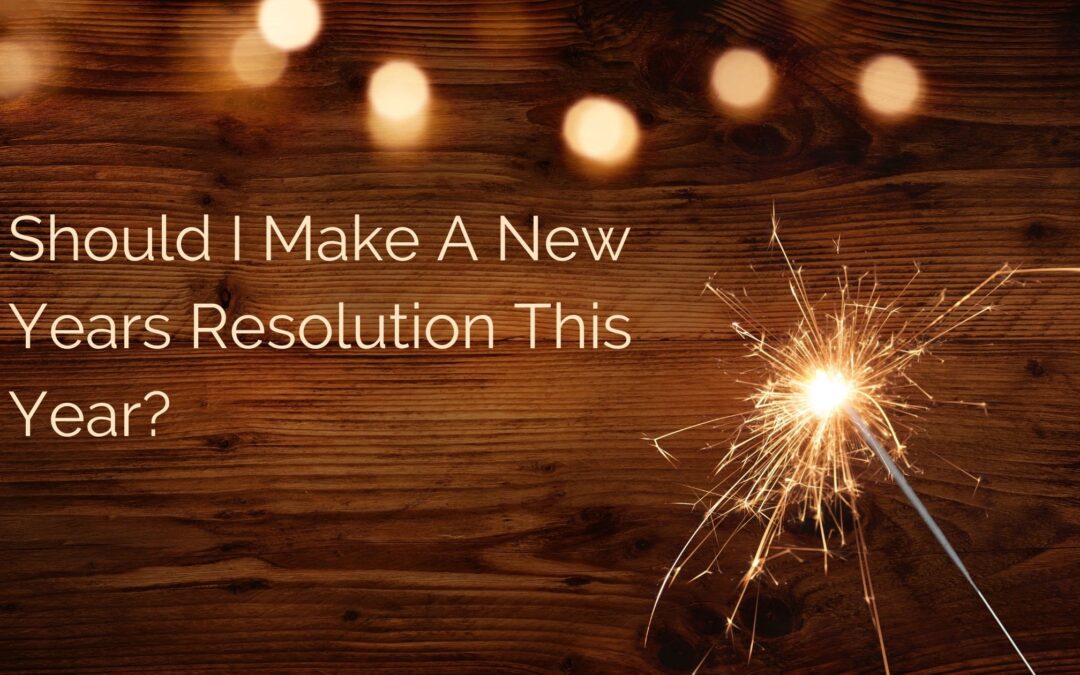Co-written by Kendra Doukas, Erin Jacklin, and Joey Tadie
Questioning whether or not to make a New Years Resolution? Maybe after 2020 you are questioning if this is a good idea as a result of the turmoil of last year. Therapists Joey Tadie, Erin Jacklin, and Kendra Doukas offer three different perspectives to the question posed: Should I or shouldn’t make a New Years resolution this year?
Dr. Joey Tadie’s Take:

We look for other markers to help us recognize when it is time for something new in our lives. New Years in particular seems to create a somewhat illusory transition point where we can contemplate ending one year and beginning a “new” year. We can suggest to ourselves that because the calendar is going to change, we can also follow suit and make a change along with it. Would you like to know what is going to happen on December 31, 2020 at the stroke of midnight? Thursday will become Friday. That is all. How is that any different than any other Thursday turning to Friday? It is different simply because we choose to apply a different meaning to the date. Putting a “1” at the end of “2021” does not make anything objectively different about the world or ourselves than it it was in 2020. The sense of a deeper and more profound timing for personal change is merely a psychological illusion. You can decide to change something about yourself at 11:05 AM on Thursday, August 19 and could enact the change more promptly than waiting four more months to arrive at the “season of change.”
Every passing moment is another chance to turn it all around. The other argument to be made here is that you don’t have to fear that you’ve “gone too far” to make any meaningful shift for yourself. You can turn it ALL around if you chose to. You might not know how or might not have what you need yet, but the decision to change cannot wait. One of the reasons I believe New Years resolutions are exceedingly likely to fizzle is that most of us are aware that many people are also making resolutions at the same time. There is inherent social pressure to make the resolution (everyone’s doing it) and there is an additional pressure related to appearing “lazy” if you choose not to make the resolution. How about this: Forget New Years and instead make your This Passing Moment resolution this passing moment. I understand that timing might matter to some degree for some types of change. But let’s be honest, it is natural for humans to avoid and delay steps toward change. I’ve even heard of shirts advertising Procastinators Unite…Tomorrow. Don’t let your moments pass without realizing that the change you desire starts when you decide it does. After everything we have learned this year, how about this moment?
Dr. Erin Jacklin’s Take:

The closure of the year also offers us a sense of closing one chapter of life and beginning a new one. The end of the calendar year can be a wonderful time to engage in self-reflection. As the weather cools and it gets dark earlier, we can find ourselves with more time at home to reflect on life. Spending time in December thinking back over the last year is a wonderful way to learn more about yourself and set goals for the coming year. Writing, even just making a bullet pointed list about what has happened in the last year can help you see what you’ve accomplished and direct you towards where you want to go next. Taking time to reflect on large time periods is important. Too often we are so focused on the day to day that we forget to pull back and gain perspective on our life. Think about where you were this time last year, what were the challenges you were facing? What were your goals? How have things changed over the last year? How have you grown? If you were already in the habit of making new years resolutions, reflect on the resolutions you made last year. These times of reflection and writing can serve as a powerful bookmark in life to help you see how much you have grown over the course of a year.
New Year’s Resolutions are at their core about hopefulness. By making a resolution you are saying to yourself: “I believe I can change my life.” The powers of positive thinking and goal directed action are well established. The reality is, if you don’t articulate your goals you are much less likely to achieve them. A ship with no navigator is not going anywhere fast. So, consider making a new year’s resolution as a commitment device that can help you reach your goals next year. Being brave enough to name what you want to bring into your life is a powerful way to manifest it. In fact, studies have shown that people who make resolutions are more likely to change their behaviors than people who don’t. So put that in your pipe and smoke it, Joey!
Kendra Doukas’ Take (One Take to Rule Them All):

It’s important to remember here that neither of the audiences are either good or bad, they just have differing personality features and things that work for them. Procrastinators get a bad wrap, and let’s just say that I might have the T-shirt at home that Joey’s alluding to in his post! Let’s also remember that research shows that procrastination is not really about being lazy; Actually most procrastinators are highly perfectionistic. Therefore, if someone who might tend towards procrastination is to try and attempt Erin’s way of doing resolutions then he or she might get very bogged down in the details of planning out how to follow through with their resolution and suffer instead from “analysis paralysis.” Joey’s wisdom of not waiting for the New Year to begin changing your life is a great one for folks who might tend to procrastinate, be prone to avoidance, or folks who use logic and reason as a way to postpone actually doing the task at hand. People in Erin’s camp, on the other hand might really need the reflection that New Years brings as motivation and even more importantly, the organization within reflection to be able to carry out their plan. They might really struggle with mindfulness or being able to more “go with the flow.” If they just try to start a new habit today then they might fail because they need the planning steps that inherently come with the reflection questions Erin posits in her post.

So, in summary, I believe we are all in agreement that resolutions are positive, even as we know that all things can change and we may have to shift, intention setting is a wonderful way to set positive thinking. As for the timing, do what works for you! If you are someone who uses arbitrary dates to simply delay further and get bogged down in detail, then Joey’s advice is key. If you are someone who enjoys the nostalgia and ritual of New Years, then listen to Erin.
Photo Credits:
Photo by Kelly Sikkema on Unsplash
Photo by Tim Mossholder on Unsplash
Photo by Wes Hicks on Unsplash
Photo by Danielle MacInnes on Unsplash

